|

songs | interviews | photos | tours | boots | press releases | timeline
Creem (US)
March 1994

Sex & the single pianist
tori amos opens up to ben edmonds
photography by Jay Strauss
I Believe In Peace, Bitch. Tori Amos Talks Back
Everybody is multi-lingual
You learn a language to communicate with other people. You learn a dream
language to communicate with yourself. But the real language, the one
that best communicates your essential nature and its relationship to the
world around you, is one you don't learn.
You find it.
You find it in the feel of a brush on canvas, the purr of a finely-tuned
automobile engine, the perfect flush of an unclogged toilet, or the
hammered keyboard of an old upright piano key. And when you do, you're
found not only your voice but something worth saying with it.
 From the time Tori Amos was first able to physically negotiate the
height of the piano stool - when her age was being measured in months
rather than years - her fingers knew where to go to continue the musical
copiano stool - when her age was being measured in months rather than
years - her fingers knew where to go to continue the musical
conversation taking place in her head. The amazement generated by her
replications of complex pieces of music she'
From the time Tori Amos was first able to physically negotiate the
height of the piano stool - when her age was being measured in months
rather than years - her fingers knew where to go to continue the musical
copiano stool - when her age was being measured in months rather than
years - her fingers knew where to go to continue the musical
conversation taking place in her head. The amazement generated by her
replications of complex pieces of music she'
Tori thinks this might have something to do with past lives. I think
it's more that music picked her and simply decided not to wait till
junior year of college to let her in on it.
This is the tongue you truly communciate in. An action language, it
arouses in significant others the recognition that they somehow share
your private emotional Esperanto. They get it.
Diane saw the video of "Silent All These Years" on MTV one night, and
her connection with it was immediate and complete. To use an exhausted
but unavoidable cliche: Diane felt that Tori Amos was speaking directly
to her. The next morning she called record stores until she located a
copy of the Little Earthquakes album. She got off work at five o'clock;
by 5:20 it was hers.
All this was triggered by a single exposure to the song and video. One!
I'm told that this phenomenen is not at all uncommon among Tori Amos
fans. If it wasn't so obviously wonderful, it could almost be creepy.
My girlfriend Diane discovered Tori at a time when she had quite
suddenly become not my girlfriend. Little Earthquakes became her closest
companion through the months we weren't together. To condense a very
long story, she found a way to expose me to the record. I responded to
it almost as intensely as she had, and Little Earthquakes became our
bridge back to each other.
A cute story, but what's most interesting about it is that, while we are
bonded by our shared passion for this piece of music, the way we
perceive it is completely different. To me, it's the album that brought
us back together, but to Diane, it's the album that held her together
when we were no longer were. These are two records that only happen to
contain the same music. (And I suspect that her Little Earthquakes may
contain some uncomfortable truths about me that I've yet to fully face
up to.)
Bare Bones
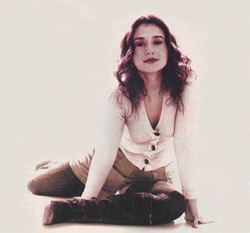 Tori Amos. Born August 22, 1963 in North Carolina. Father a Methodist
minister, mother part Cherokee. Playing piano by ear at age two. At five
wins a scholarship to the Peabody Conservatory in Baltimore, is kicked
out at 11 for having too many ideas of her own. From 13 on, plays gay
bars and cocktail lounges in the Washington, D.C. area. Signs with
Atlantic Records, moves to Los Angeles. Hairspray band Y Kant Tori Read,
a creative running away from home of sorts, releases 1988 album that is
met with mass indifference. Composes and records most of the song cycle
that will become the Little Earthquakes album, moves to London. Brits go
wild for her quirky, confessional songs and stark, sensuous live
performances. Kate Bush, Joni Mitchell, Patti Smith, Marianne Faithfull,
and Shirley MacLaine comparisons abound. Early 1992: LE hits U.K. Top
10. In America, becomes one of those rare albums that, with only minimal
radio and MTV support, creates its own audience. LE goes gold in U.S.
and sells 1-1/2 million around the world. Early 1994: Released highly
anticipated follow-up Under The Pink. Most of us are still digesting LE,
which continues to sell briskly. She makes the cover of Creem.
Tori Amos. Born August 22, 1963 in North Carolina. Father a Methodist
minister, mother part Cherokee. Playing piano by ear at age two. At five
wins a scholarship to the Peabody Conservatory in Baltimore, is kicked
out at 11 for having too many ideas of her own. From 13 on, plays gay
bars and cocktail lounges in the Washington, D.C. area. Signs with
Atlantic Records, moves to Los Angeles. Hairspray band Y Kant Tori Read,
a creative running away from home of sorts, releases 1988 album that is
met with mass indifference. Composes and records most of the song cycle
that will become the Little Earthquakes album, moves to London. Brits go
wild for her quirky, confessional songs and stark, sensuous live
performances. Kate Bush, Joni Mitchell, Patti Smith, Marianne Faithfull,
and Shirley MacLaine comparisons abound. Early 1992: LE hits U.K. Top
10. In America, becomes one of those rare albums that, with only minimal
radio and MTV support, creates its own audience. LE goes gold in U.S.
and sells 1-1/2 million around the world. Early 1994: Released highly
anticipated follow-up Under The Pink. Most of us are still digesting LE,
which continues to sell briskly. She makes the cover of Creem.
The "Silent All These Years" video showed up at number 98 on the Rolling
Stone top 100 videos of all time. When the dust finally settles, it will
place higher than that. It is a superb film. It tells you everything
about the new artist and makes you want to know more. For its audience,
seeing "Silent" on MTV was the '90s equivalent of "Like a Rolling Stone"
or "Satisfaction" on AM radio in 1965.
The defining moment comes at the very end of the clip, and it's one that
you don't even catch the first time through. She's been lip-synching the
lyrics but they freeze on a full frame of her face for the song's final
instrumental passage.
Or so it seems, because the frame isn't totally frozen. As the final
string unwinds, she's unfrozen for a milli-second twice, letting a
whisper of a smile play across her mouth. There's a whole other universe
in that crooked curl of the lip, a little post-modern Mona Lisa. Except
that where Mona's smile indicated a secret kept, Tori's promises a
secret to be shared.
Me and Neil Hangin' Out With the Dream Queen
"I think she's absolutely magic."
Neil Gaiman knows a bit about magic. The Englishman is the author of The
Sandman, a monthly graphic series that is among the most successful -
and fanatically followed - titles in the history of DC Comics. He also
writes novels, film scripts, and is involved in projects with Alice
Cooper and Lou Reed that you'll be hearing more about.
He also turned up as a character in a song by a certain red-headed
Sandman reader.
"Whenever I do signings," he tells me, "people give me presents. I get a
lot of tapes. Most of the demos are awful. When you're handed the
umpteenth Scandinavian death-rock tape - four Swedes gloomily
accompanying themselves on bass and harmonium, going [sings in mock
Sweedish accent] 'Morpheooos, Lort uff dreams! Comm down frum the
heavoons!' - your enthusiasm tends to wane.
"Occasionally there are pleasant surprises. At the San Diego comic
convention in '91, I was given a tape and told I was mentioned in one of
the songs. There was just a slip of paper with this name I'd never
heard, Tori Amos, and an address. When I finally got around listening to
it three weeks later, I was gobsmacked, a colloquial English expression
denoting amazement. It was stunning and terrific and wonderful. I
immediately sat down and wrote her a fan letter."
Not surprisingly, considering their creative similarities, a genuine
friendship has developed. Tori contributed an introduction to Neil's
recently-published hardcover edition of Death: The High Cost of Living.
Bits of Amos lyrics - Neil quite cheerfully admits, whole clumps of her
dialogue - have been known to creep into The Sandman. Some claim that
the Sandman character Delirium has evolved a more-than-passing
resemblance to the singer.
"As a live performer she's stunning." Neil marvels. "I mean she sits
there and she fucks the piano stool!"
Wondering where her performace style comes from, I tell him that I'm not
sure I can imagine five-year-old piano prodigy Tori humping her way
through Bartok at the Peabody Conservatory.
"Terrifyingly enough, I can," he laughs. "One of the things that's most
delightful about her is the wonderful combination of the precocious
five-year-old and the fucking the piano stool.
"The show that sticks in my memory was her first big concert in London
when Little Earthquakes came out. Halfway through the set a drunk
started acting up in the audience. 'Show us yer legs' and that kind of
stuff.
"She just stopped playing, turned around and focused on the guy in the
audience. She smiled and said 'What's your name?' He grumbled something
and she said, 'You have to understand, I've been playing cocktail piano
for 15 years. I deal with guys like you every night.' At which point the
rest of the audience were ready to take the guy out and hang him if she
so much as gave the word. But she just smiled at him. 'This song's for
you,' she said, and went into 'Leather.'"
"Look, I'm standing naked before you
Don't you want more than my sex?"
"It was the most elegant handling of a heckler I've ever seen.
"To create anything approaching real art, there's a certain amount of
nakedness involved. The willingness to bare more of your soul than is
comfortable for you or the audience. She allows herself to say things
that most people wouldn't dare say."
Diane is hovering.
"I'm not going to hover," she announces anxiously. "Aren't you excited
to be talking to her," she asks, betraying her limited exposure to rock
stars.
"Not really," I confess. "What's exciting is the way I connect with her
music. I don't need to know anything more. In most cases, you don't want
to know more than that, believe me," I add, betraying my over-exposure
to rock stars.
Diane looks at me as if I'm from the 12th moon of Pluto.
"Okay," I say, "how about if you do the interview?"
She immediately recoils from the suggestion. "No way, what am I supposed
to say? 'Gee, I rilly luv yer music.' That sounds so stupid. And what's
she supposed to say? 'Gee, I'm really honored that you chose my music to
obsess over.'"
We decide to shut up and listen to the new record, before this starts to
sound any more like a bad script for Mad About You.
I needn't have worried. Tori is delightful to talk to.
"She's one of the few genuine surrealists I know," Neil Gaiman had told
me. I understand what he means. She talks to you about songs like you're
gossiping about mutual friends. She refers to her songs as the living
things she believes them to be. With most artists this would come off as
horribly pretentious. With Tori it's so unforced and natural that you
barely notice it.
Tori has an endearing conversational quirk. She begins many of her
sentences in mid-thought, like she's tripped it up from behind as it's
moving away from her. Then she realizes where she is and doubles in
mid-thought, like she's tripped it up from behind as it's moving away
from her. The she realizes where she is and doubles back for your
benefit, throwing the beginning of the thought into the middle of her
sentence, before leaping ahead to the conclusion that rolls it all up
into a verbal small package. You have n
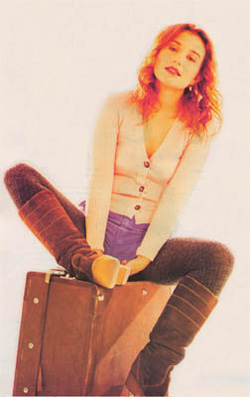 For your convenience, we have untangled these verbal pretzels.
For your convenience, we have untangled these verbal pretzels.
CREEM: Please tell me this isn't your 147th interview today.
TORI AMOS: Yes it is, but don't worry. I'm going to focus. I took a
little break because the one right before this was so draining. The
person asked me the same question four times.
Because they weren't satisfied with the answer you gave?
I answered it, but when it came up again it was obvious they didn't hear
a thing I said. I was trying to explain the song "God," because the
question was, "I can't believe you made God a man." I said, excuse me,
have you read any history? I don't mean to insult you, but this is not
about my opinion here. This is about the institution, and I don't think
the Pope is talking to a babe with tits when he says, "Lord, Almighty
Father." Hello?
Can you tell me a little about how this new album was born?
When I had finished the last tour, "Silent" came up to me and goes,
"There's some babes that want to meet you." I said, no way, I don't want
to meet them. And she said, "Look, if you don't meet them willingly,
then you're going to have to meet them in a very unwilling way, because
these things have to get worked out." I was like, oh no...
Why did you resist it?
What's growing about if there aren't territories where you don't even
understand the language? Two years ago I wasn't able to look at my
violent side - that just wasn't part of my consciousness. But then why
am I in situations where I'm ready to throw
somebody up against the wall and rip their head off? I've been talking
all about peace and here I am wanting to kill someone.
With Little Earthquakes, did you get a lot of accumulated psychic
baggage out of the back of your closet? It sounds like an album that
wrote itself.
Yes. I was talking about stuff I hadn't looked at, in some cases, for 15
years. On that record I began to acknowledge things, but that obviously
is only the beginning of the work. The next step is, how do you apply
this to your life?
What I've begun to learn in the last year is how I've put things in
categories. I've made this a good feeling, and that a bad feeling. But
wait a minute, Tori it's not about good and bad. Violence isn't a bad
feeling, it's just violence and you have a choice on how you want to act
it out. But if you make it bad, it's like: No, don't you dare think
about this. Don't think about wanting to punch him because he humiliated
you in front of all these grown-ups. You think it's wrong to feel that
way because he's my father, or he's my teacher, or... he's God, who has
humiliated me as a woman, in a sense. Because I've been less than. I
haven't been able to be the Pope. I've been able to be the Virgin Mary
and Margaret Thatcher, and both are kinda sexless.
Mary was our role model in the Christian church, and we're talking about
a woman that was a sexless being in the teachings. I think we can both
see what that's going to do to a whole culture. Pieces get cut out so
that certain cultures can control it, and what got cut out in the
Christian church was the sexuality and the passion. The shadow side of
that was Mary Magdalene, who we've always been taught was a whore
because that's the camp I was in. But why did I have to be divided from
the two Marys? Shouldn't it be about the balance? It should be about a
wholeness, but it's about division.
There's a division of power, male and female power, and there's a
division within my own being. There's been a dishonoring of us with each
other, and us with ourselves, and women against women, and men against
men, and women against men... and that's how the song "God" got written.
The institutional God who's been ruling the universe, in the books, has
to be held accountable. I want to have a cup of tea with him and just
have a little chat.
I feel like the song is a releasing, a sharing. It's honest and loving.
And it's sensuous. It's the goddess coming forth and saying, "Come here,
baby. I think you've had a bit of a rough job, and I don't mind helping
out now." Which I think is really cute.
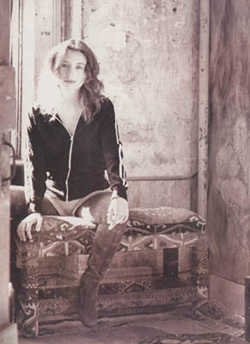 I've always felt uncomfortable with "Me and a Gun," Tori's unvarnished
account of enduring a kidnapping and rape that was the most celebrated
song on Little Earthquakes. It's not the subject matter that makes me
squeamish (though perhaps that in itself says something), nor is it the
song's naked acapella setting.
I've always felt uncomfortable with "Me and a Gun," Tori's unvarnished
account of enduring a kidnapping and rape that was the most celebrated
song on Little Earthquakes. It's not the subject matter that makes me
squeamish (though perhaps that in itself says something), nor is it the
song's naked acapella setting.
It has more to do with the song's high public profile. It was the lead
track on her first English release, regularly performed on television,
and a central part of her video compilation. It was also a perfect hook
for inkmongers; you could count on finding it within the first three
paragraphs of almost every article written about her.
It's not that I think the song wasn't worth any of the above, it's that
the cumulative effect of all of it was to make it emblematic of the
album and the artist. This, to my mind, sells both short. She became
"the woman who wrote that song about being raped," when the woman who
wrote that song was really only a starting point for the artist Tori
Amos has become. The song's declaration of freedom from the oppression
and guilt of that experience (implicit in the fact of its public
performance as much as in the words) is important, but not nearly as
important as what she has used that freedom to do.
"Bells for Her" is the "Me and a Gun" of Under The Pink. The difference
between the two songs is also that of the albums that contain them.
"Bells" is about the murder of an innocence as surely as the earlier
song, but it's not the kind of Big Drama that'll generate headlines in
Glamour and Women's Wear Daily. Yet, in its way, it is no less
disturbing and the cracked chiming of the piano on the new song may be
even more chilling than the dead air with which she surrounded her
acapella reading of "Me and a Gun."
And that voice! You don't just hear the words she's singing, you hear
the whole breath. So not only are the lyrics intimate, the sounds that
delivers them to your ear is intimacy itself. This gives what she's
saying the locomotion of truth, even when your rational mind tries to
tell you otherwise.
Tori Amos is not on the cover of this magazine because she wrote one
notorious song. She's there because she's turning out to be an entire
catalog.
CREEM: Much of what's been written about you talks about the child of
the church going into secular music, hardly a new story. What's
interesting to me is that if you look at black performers who come out
of the church tradition, they seem to keep their ties to the church
after they go secular, whereas white performers seem to regard it more
as something that has to be left behind, something you sever your
relationship with.
TORI AMOS: Right.
If you talk to Aretha Franklin, she'll still go sing in church. I don't
get the feeling that you would.
Not now. No. Unless they wanted me to sing "God" or "Crucify."
Is that because white religion is about what God keeps out, rather than
what embraces?
Well, look at the music in the white church. All passion has been cut
out. That's a reflection of what the teaching is - passionless. In the
black church it's passion-filled. The spirituals that came out of
African-Americans in slavery was one way they gave themselves strength.
In the white church the intention was different, the need was different.
It was about suppressing. Suppression. In the black community it was
about releasing them from oppression. That's very different.
I understand that suppression, Cotton Mather was my great-great-great-
grandfather.
Boy, he probably burned me in a past life.
I'm paying the price now. Half my family are Christian Scientists and
the other half are doctors. You can see why I'm confused.
[laughs] Yes. Both my father's parents were ordained ministers in the
Appalachian Mountains in Virginia.Appalachian Mountains in Virginia.
Both very educated, that's why they were kinda dangerous. [laughs]
Especially my grandmother, a very intelligent woman. She could interpret
a Shelly poem like nobody I've ever known. It was
Was it an interpretation you agree with?
No! Nothing I agree with. I think Grandma was looking for what I'm
looking for, which is wholeness. But her way of going about it was to
try to make other people acknowledge their sin, and take out parts of
themselves that she thought were sinful. To get to God. But what I want
to get to is every part of myself. Because god/goddess is in everything
that makes me up. And I don't believe for one minute that we can't heal
ourselves. We can. Jesus even said that.
I'd like to believe you.
Well, it's believing in you.
Exactly. That was the central question of your song "Winter," wasn't it?
Yes!
So have you answered that question satisfactorily?
Check it out. On "Winter," the father sang to me, "When you gonna make
up your mind/When you gonna love you as much as I do?" and in "Pretty
Good Year" on the new album, I sing to the boyrfriend, "What's it gonna
take till my baby's alright?" There's no self pity in the song and yet
it's a tragedy. It's a tragedy because I can't make him love himself. I
can't do it. No matter how much I beat it into him, I can't do it for
him. Funny how the tables have turned isn't it?
Can you do it for yourself?
I am doing it, and every day is a different experience. When I wrote
"Cloud on My Tongue," I was having a hard day because I put all my power
in this other person. Sometimes I feel inferior to men who have this raw
wolf energy. The concept of free expression in your life. I have it in
my work but not in my life. So when I meet these people who have it, I
want to get close to them because...
You want to suck it up for yourself?
Yes. I try and suck their energy, that's what I do.
Now you know how it feels to be a Tori Amos fan.
Oh, get off! [laughs]
But don't you think that's what people find in your music?
I feel like my music is talking about you empowering you, not you coming
to me to get empowered.
That's what you hope will happen. My experience is that it's a two stage
process. They first come to you thinking that's something you can give
them. If they really get it, they go beyond that. But a lot of them
don't.
Well... then we're all in the same boat, aren't we?
Two weeks later I talked to Tori again. She remembers Diane's name, the
name of Diane's daughter Jessica, and most of the pertinent details of
our previous conversation. I am impressed.
Little Earthquakes was predominantly about your relationships with male
figures. But this new one seems more directed toward a female energy.
Well, yes, it is, actually. And what you think is going on is not what's
going on. I'll take you into the ladies' bathroom. You can see what's
really happening. We gotta hide you, though.
We're there, dude.
There are women friends in my life and we're very supportive of each
other. It's about equality and sharing, and not about cat fights and
trying to tear each other down. There have also been women very close to
me where it's just been ferocious. And vicious. But in a sweet little
new-age way, know what I mean? Just imagine if you met Alice in
Wonderland and she smacked you in the face! It hurt me very deeply,
because I had this idea of what The Sisterhood was.
Again, it's not about good guys or bad guys. It's not about this team or
that team, although on "Cornflake Girl" there are the cornflake girls
and the raisin girls. And you know I'm a raisin girl.
Yeah, but you grew up in a box of cornflakes.
I even did the cornflake commercial. "Cornflake Girl" is about betrayal
between women. It was based on Alice Walker's Possessing the Secret of
Joy. That book hit me on so many levels, if you know what I mean. I
believe that cultural memory is passed down through the genes. Why do I
react to certain things that... hey, I just fell off the swing. What's
happening here?
Why does that smell of burning flesh seem so familiar?
Right! [laughs] In this book she describes how, in certain cultures, the
mothers sold their daughters to the butchers to have their genitalia
removed. I was overcome by this sense of betrayal. The mothers took the
daughters to have their sex removed. There is no deeper betrayal, Ben.
There's a mixed message that Mother will always protect you. There is
this mixed message that The Sisterhood is safe. I had a rough time with
the idea that "safe with your sisters" might not be true. I had this
illusion that my sisters had only the best intentions for my other
sisters. No, Ben, this is not so! The Sisterhood has been brutal to each
other.
It's just stripping away one more rope that I'm hanging on to. You know
[sings] "looking for a saviour in these dirty streets." It comes back to
how I've got to stop looking to the outside. I could try to cut away
pieces of myself to stay in the relationship, which we all know about,
whether it's a job relationship, a friend, or a lover. We make ourselves
less so that we stay there. Or the opposite. We try and make somebody
else feel less. The friendship thing doesn't get talked about much.
Because it's not usually sexual, it tends to get put off to the side.
Exactly. But a sisterhood becomes like family. You would give your life
for this person.
That's how I see your song, each album, you're building your own family.
Things get added and things get taken away, but it's all this process of
you rebuilding a family for yourself.
Yeah. You've just made me aware of that right now. I think you're right.
And it kinda gives me a bit of comfort when you say that. I am making
friends as they come out of the piano.
Tell me if I'm wrong, but my impression is that the sound of the piano
on "Bells For Her" is as important as what it's playing or what the
words are saying.
Absolutely.
It sounds to me like a corrupted lullaby. In the beginning I had
absolutely no idea what the song was about. But just the sound of that
piano began to tell me about the song.
Right! That's wonderful. It's about when I say [sings] "Can't stop
what's coming, can't stop what is on its way." It was written and
recorded exactly as you hear it. The lyrics came in that moment. It was
almost like a trance, how that song came. It just came through. I was
translating as the feeling came through my body. Spontaneous, no fixes.
I had to write the lyrics down after I sang them to see what they were.
I just try to strip myself, peel myself like an onion. At different
layers I discover stuff. I do it publicly, and if it helps to inspire
somebody else, which inspires somebody else, which inspires somebody
else... we're talking about a really exciting world here.
I've been inspired by loads of people who showed things of themselves to
me. That's the creator coming through another being. You know when you
hear something pure. Like Liz Phair. Do you know that record?
Yes. Yes. Yes.
I just heard it. I've been away in another country, what do I know? I
heard it and went "Thank you for that. I feel so much better today."
It's like this wonderful reciprocal sharing thing. It's so inspiring,
and it inspires me.
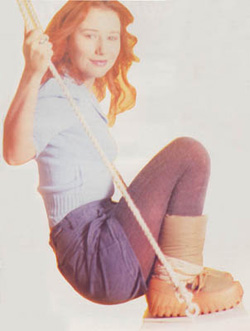 "You stole my idea about the piano."
"You stole my idea about the piano."
Diane has been upstairs transcribing the tape of my first interview with
Tori, but she's downstairs now and in my face. I tell her that I'm not
really stealing her idea, it's more that she's completing a thought for
me. She's helped me find another small piece of this puzzle I'm working
on. She's not exactly convinced, but heads back upstairs anyway. Halfway
up, something else hits her. She stops. "You're not going to steal what
I said about her breathing too, are you?"
Well, I, ah, umm...
Diane is beginning to understand what it means to live with a writer.
"They all laughed at Sonny / When they saw his leopard vest / But long after they've
passed away / Sonny's records will play." -- The Barbarians, "What the New Breed Say"
Those stirring lines in support of rebel visionary (and Atlantic Records
recording artist) Sonny Bono were recorded in 1965 by proto-garage band
the Barbarians. It was
Twenty-nine years later, the same Doug Morris is the co-chairman/co-CEO
of the Atlantic Group (it is not known whether Sonny had a hand in
getting him the gig). He is also the senior executive who has shepherded
the career of Tori Amos.
The funny thing is that there's still more than a little of that vintage
'65 vision in Doug Morris. Change "Sonny" to "Tori" and we're in 1994,
the philosophy is essentially the same, originality wins out.
"I'll be very honest with you," Morris states with no hesitation, "I
basically gave her a hard time. When she brought me Little Earthquakes,
I didn't get into it on the first listen. It was very quiet, very
introspective, and for the life of me I had no idea how we could
possibly break this artist. I was actually kind of annoyed, because it
had been a very expensive album to make.
"It's been my experience that when you encounter a unique artist, it can
take a while to get it. After listening a lot, I finally got it, thank
God. 'Winter' hooked me first, and the more I listened to it, the more I
fell in love with it.
"But while I'm slowly falling in love with it, she's sitting in her
apartment in L.A. - where all the furniture was made of this soft
plastic that would take the form of your body when you sat on it -
thinking that I don't like the record at all.
"So I called her up and said, 'I don't know how to tell you this, but
I've fallen in love with your record.' She went, 'Whaaat?' I told her
that I had also come up with an idea of how to handle it, and would she
like to move to London?"
It was a masterstroke. Europe has always been willing to give eccentric
American originals - from Josephine Baker, Willie "The Lion" Smith, and
Ornette Coleman to Jimi Hendrix and Captain Beefheart - the even break
they don't get at home. Tori was soon clasped to the normally reserved
English bosom, and success throughout Europe paved her way back to
America.
One English music weekly was ungracious enough to suggest that Tori's
singer-songwriter persona was engineered by her record label as a
corporate response to the failure of a previous rock record she'd made,
and that the success of Little Earthquakes was due to their savvy
manufacturing of "word of mouth." Putting aside for a moment the
question of why Brits feel compelled to make class warfare out of every
situation, let's talk some reality here. Word of mouth simply can't be
manufactured. If record companies could, every record they put out would
be a hit. The most you can do is try to create an atmosphere in which
that word can be passed. If the music doesn't have the power to
captivate listeners, all you'll hear back is silence.
In the case of Tori Amos, Atlantic had no other choice. Little
Earthquakes didn't lend itself to conventional marketig strategies, and
it certainly didn't fit any American radio formats.
"I'm glad this hasn't been a radio driven project," Morris tells me. "A
unique artist doesn't make records for radio. She should make records
she loves, and that the people who love her will love. It isn't the
easiest way to do it, but if you're willing to do it the hard way, it
can last forever. If you have an artist with that kind of talent, you
let them lead, and they're going to take you to places you've never been
before.
"Tori is someone you have to let fly."
I tell Allen Ginsberg, the world's greatest living poet, all about Tori
Amos.
In 1995 Ginsberg abandoned the mannered imitations of other people's
ideas that were getting him semi-nowhere. He wrote something just for
himself, tossing off lines like a fearless bebop saxophonist. It was a
private act, something Allan wrote to explain himself to himself, but
"Howl" turned out to be a poem whose brave, authentic voice spoke, and
continues to speak, to millions.
In its own way, Little Earthquakes caught a flash of that same
lightning. So I ask the 67-year old bard if he has any words of wisdom
for a young song poet who's just written her own "Howl."
"Hmmm." The Lion of Dharma strokes his trademark beard thoughtfully.
"I'd tell her to learn some form of awareness practice or meditation, so
as to maintain connection with your own mind, and to continue developing
and enriching your appreciation of your own mind. It's really just a
question of recognizing what's there already, as she did when she broke
through and wrote for herself. It's the old thing: 'Fool, said the muse,
look in thy heart and write.' And have courage -- that breakthrough marks
the beginning of the path."
That sounds pretty much like the Tori I talked to. I think our baby's
gonna be alright.
Exclusive extras from the interview posted to the CompuServe library by Chris Nadler, Editor, CREEM magazine
Ben: I never looked at the song "God" as being exclusively about the deity.
Tori: Not totally. It's about the patriarchal system. But the patriarchal
system is headed by an energy force that has very big feet. And my whole
feeling was whether my belief system now is that the Big G is sexless...um, I
don't mean that...I mean is all sex. Even the ones that are kinda girl, kinda
boy.
Ben: The church is sexless, God isn't.
Tori: Yea. Thank you. Thank you. I HAVE been doing too many interviews today.
~ ~ ~
Tori: In "Cloud on My Tongue," I put all my power in this other person. I
think that they have something that I don't have. Well, of course we all have
things the other person doesn't have as far as abilities. But we ALL have
emotion that's capable of being complete for each one of us. But you can't be
complete for me. We know this in the head, but to really apply it is another
thing. Because when you feel inferior, you feel inferior. Sometimes I feel
inferior to men who have this raw wolf energy. I just got to this recently. It
doesn't mean that I still don't, like, snake around and leak all over the
place when I'm around one of them. I kinda go "Oh, God, here it is again. What
am I gonna do?" What's happening is that I cut that part out of myself a LONG
time ago. Because I judged it to be bad, and I was afraid of it. I was afraid
I wouldn't be respected if I got in touch with that. I'm not talking strictly
about sex. That's like a form of generating that energy, but just because
you're having sex doesn't mean you're generating that energy. Do you see what
I mean? But there are other ways of trying to get to it. Like music.
Creativity tries to get you to that expression. That kundalini energy. I do it
when I'm playing but I've really had a hard time bringing it into my life. I
sit there sometimes like all the knobs have all been turned off. And I'll see
something with the knob turned on and I go "How did they do that?"
~ ~ ~
Tori: There's this power thing that's happening. I'm talking about personal
relationships for a minute. I'm talking about them with men. We'll talk about
my personal relationships with women later, because they're both very
important and I have both in my life and this record is SO affected by that.
But...I've really had to understand what I've wanted from certain men that I
pull into my life. And it's not that I want to be compassionate to them or
anything. I'm just telling you the truth. I could've told you "Of course it
is...I want to make them brownies" and all that stuff. But what I'm REALLY
after is they have a force that makes me feel better about myself when I'm
around them. It's not just because I like them; I'm kinda in awe of them.
Ben: Which is, not so oddly enough, the thing that I like about women.
Tori: Really?
Ben: It's that wholeness, isn't it?
Tori: Yeah.
Ben: Or the possibility of that wholeness.
Tori: Yes. Yes. But more than just liking this about men, I...One isn't
enough. It's not like I meet one and there's a balance and we fill in each
other's holes. I've got loads of holes, Ben!
~ ~ ~
Ben: I understand that you were classically trained, that you went to the
Peabody Conservatory when you were five. Did you get involved with classical
music because you loved it, or were you nudged in that direction because
classical is the only acceptable outlet for someone who's got the music
disease?
Tori: Well, I was playing at two. By the time I was four I could play scores
of musicals and everything up and down the piano. I auditioned at the Peabody
when I was five, but I didn't really know why I was going there except that
these people like music and I like music, so maybe we can go eat peanut butter
sandwiches together. That was the whole concept to me: We'll understand each
other and make lots of music and won't that be fun? My parents took me to the
school because they were encouraged that I had a "special gift" as some of the
parishioners would say, and that's where you took a pianist. They didn't think
about giving me a Hammond and asking me if I wanted to join the Doors. So I
guess the goal in the back of everybody else's head was that I would become a
concert pianist. But that didn't go very well.
Ben: Before you went to the Conservatory, what kind of music were you
attracted to?
Tori: I listened to the Beatles all the time. My brother's almost ten years
older than I am, so those records were coming in and out of the house. Some of
them went out REAL quick, because my father was pretty strict about certain
things. My mother had LOADS of records from the '30s, '40s, and '50s. She
worked in a record store before she married my father. From a record store to
a minister's wife, if you can imagine that. So I had access to things like
Fats Waller and Nat King Cole, George Gershwin, and Judy Garland. But I
remember hearing "Sgt. Pepper'" and just going, "I want to be in that band!"
So when my father said me, "What kind of musician do you want to be when you
grow up? Do you want to play Bach or Beethoven?" And I went over to the record
collection, pulled out "Sgt. Pepper" and said, "I want to do this!"
Ben: So was the conservatory kinda like musical boot camp?
Tori: Of course. But they know nothing about any other world than their own
world. So how do you teach musicians to be all they can be when all you're
getting is guys that have been eaten by the worms? Hey, Bartok is amazing
stuff. Learning that has given me a foundation. But so did Jimmy Page. So did
John Lennon. So did Joni Mitchell. So did Patti Smith. To really be a musician
is to keep expanding.
~ ~ ~
Tori: Some of the most interesting, growing conversations I've had, and some of the most incredible wisdom I've gotten, has been backstage from the people who've come to see me play. I've really learned a lot just by talking to them. They all have a story to tell. And most of them are really working on
consciousness; there is a commitment to the idea that the earth is going to the next stage of development. Which means asking where we're going to be in all this if we don't take some sort of action to define our responsibility as human beings? That is the crux. And there's all kinds of ways of finding that out. I just try to strip myself, peel myself, like an onion. At different layers I discover stuff. I do it publicly, and if it helps somebody else to inspire them, which inspires somebody else, which inspires somebody else...then we're talking about a really exciting world here. I've been inspired by loads of people who showed things of themselves to me.
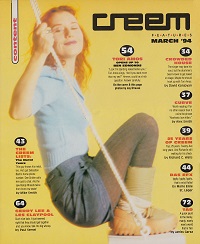 
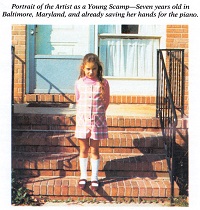
[scans by Richard Handal]
t o r i p h o r i a
tori amos digital archive
yessaid.com
|